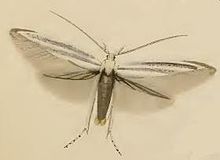Coleophora anatipennella
| Coleophora anatipennella | |
|---|---|

| |
| Scientific classification | |
| Domain: | Eukaryota |
| Kingdom: | Animalia |
| Phylum: | Arthropoda |
| Class: | Insecta |
| Order: | Lepidoptera |
| Family: | Coleophoridae |
| Genus: | Coleophora |
| Species: | C. anatipennella
|
| Binomial name | |
| Coleophora anatipennella (Hübner, 1796)
| |
| Synonyms[1] | |
|
List
| |
Coleophora anatipennella is a moth of the case-bearer family (Coleophoridae).
Taxonomy
[edit]It was described by Jacob Hübner in 1796. It is the type species of its genus (Coleophora) and, via that, of its family.[1]
It is not completely understood to what moth Johann August Ephraim Goeze's 1783 description of the supposedly distinct C. bernoulliella refers to, but it is presumed to be the same species as C. anatipennella.[1]
Description
[edit]
The wingspan is 14–16 mm (0.55–0.63 in). Head white. Antennae white, ringed with pale brownish. Basal joint with rather long tuft. Forewings white, posteriorly sprinkled with brownish. Costal cilia without dark line. Hindwings rather dark grey.[2]
Range and ecology
[edit]C. anatipennella is found in Europe eastwards to the Ural Mountains; southeastwards its range extends across Asia Minor to Iran.[1] It has also been recorded from Japan.
The caterpillars feed mainly on the leaves of Rosaceae and Fagales trees, as well as some others. Recorded host plants are:[1]
- eurosids I: Rosales: Rosaceae
- Crataegus (hawthorns)
- Malus domestica (apple), and possibly other Malus
- Prunus (cherries, plums and peaches), including wild cherry (Prunus avium), blackthorn (Prunus spinosa), and possibly others
- Pyrus communis (European pear)
- Sorbus aucuparia (European rowan), and possibly other Sorbus
- eurosids I: Fagales: Betulaceae
- Alnus (alders)
- Betula (birches)
- Carpinus betulus (European hornbeam)
- Corylus avellana (common hazel)
- eurosids I: Fagales: Fagaceae
- Castanea sativa (sweet chestnut)
- Quercus (oaks)
- eurosids I: Malpighiales: Salicaceae
- Salix (willows)
- eurosids II: Malvales: Malvaceae
- Tilia (limes)
- Basal asterids: Cornales: Cornaceae
- Cornus sanguinea (common dogwood)
References
[edit]- ^ a b c d e Savela, Markku. "Coleophora anatipenella (Hübner, 1796)". Lepidoptera and Some Other Life Forms. Retrieved 18 December 2019.
- ^ Meyrick, E., 1895. A Handbook of British Lepidoptera MacMillan, London pdf
 This article incorporates text from this source, which is in the public domain. Keys and description
This article incorporates text from this source, which is in the public domain. Keys and description
External links
[edit]- Coleophora anatipennella at UKmoths
